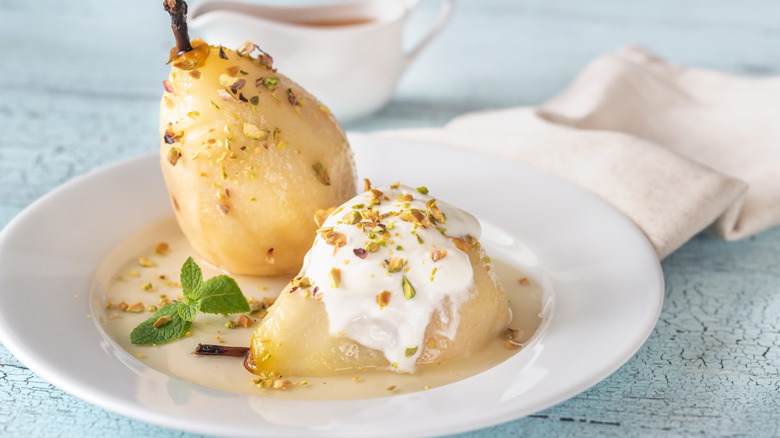Why You Shouldn't Use Fully Ripe Fruit When Making Poached Pears
Poaching pears, or just about any fruit your heart desires, is a lovely way to create a simple but delicious dessert to cap off the evening. The concept of poaching pears, per Perfectly Provence, was made famous by chef Auguste Escoffier when he created his Poires Belle Helene, which consists of pears simmered in vanilla syrup and served with warm chocolate sauce. But poaching is not confined to just pears. According to Food52, apples, oranges, and even dried fruit can be poached and used in yogurt, homemade tart recipes, or a favorite salad.
When it comes to what sweet liquid and spices to use when poaching your fruit, the possibilities are seemingly endless. Celebrity chef Giada De Laurentiis favors grappa to poach her pears for her poached pear crostini, according to Today, while Food Network shares a recipe from Alton Brown that uses white wine, such as Riesling or Viognier, to make poached fruit. And Bobby Flay has a recipe for poached rum raisin pears to eat alongside some frozen yogurt. However, while they all might use different liquids, one thing they have in common is firm pears. In fact, you should avoid poaching fully ripe pairs.
Follow Goldilocks' lead
When you are poaching pears, you want to take a page out of Goldilocks' playbook and find pears that are not too hard and not too soft but just right. According to MasterClass, this essentially means they should be "slightly underripe." You should avoid overripened pears for the simple reason they will "fall apart" when you poach them. Of course, you don't want pears that are too hard either unless, as Mon Panier Latin notes, you want to spend a lot of time waiting for them to soften up as they simmer in their sugary liquid.
How can you tell if your pears are firm but ripe enough to use? Master Class offers the pro tip of moving your fingers along the "flesh near the stem." If it is "barely soft" you are in business. What type of pear works best? David Lebovitz suggests using Bosc, Conference, or small Seckel pears. He also notes that Anjou and Winter Nellis are good choices, but recommends staying clear of Comice and Bartlet pears simply because they are too soft.

